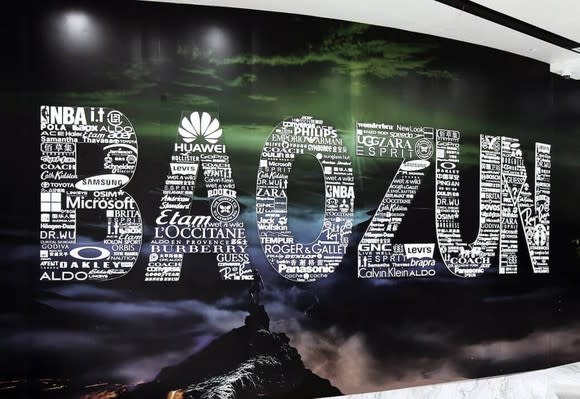A Strong Case for Buying Baozun Inc.
Baozun Inc. (NASDAQ: BZUN) may not be a household name in the U.S., but there's a good reason for investors to learn more about this high-flying Chinese e-commerce play.
Shares have already soared since its 2015 initial public offering: The stock has gone up 450%. It's nearly tripled over the last year, as revenue growth has accelerated in recent quarters, and profitability has improved as the company moves to a service model. Meanwhile, the growth opportunity in Chinese e-commerce has the market salivating.
China's largest brand e-commerce partner often draws comparisons to Shopify (NYSE: SHOP), which has also surged in recent years, but there are important differences between the two. While Shopify focuses mostly on software, Baozun offers a suite of services beyond IT, including warehousing, distribution, and customer service. Shopify tends to attract mostly small and medium-sized businesses as customers. Baozun, on the other hand, focuses on multinational companies -- like Philips, Nike, and Microsoft -- that need help operating their e-commerce businesses in China and navigating labyrinthine Chinese regulations.
Let's take a closer look at some of the reasons Baozun looks like a strong buy today.

Image source: Baozun.
China times e-commerce
Baozun is sitting at the intersection of two of the biggest growth trends in the global economy: China and e-commerce.
It's no secret that the Chinese economy continues to explode. The world's No. 2 economy grew by 6.9% last year, its fastest pace since 2010, and its GDP is expected to increase 6.5% this year. Beyond that, China is expected to surpass the U.S. as the world's biggest economy by 2030.
With the Chinese economy on the rise, American companies have been focused on tapping Chinese growth. Starbucks, which is one of Baozun's customers, believes that it will one day have more stores in China than in the U.S. Apple CEO Tim Cook made a similar prediction that China would one day be Apple's biggest market.
Meanwhile, China's leading online retailers -- like Alibaba (NYSE: BABA), which owns a significant stake in Baozun, and JD.com (NASDAQ: JD) -- have also seen revenue surge, as more Chinese come online and the country's delivery infrastructure improves. Alibaba posted 74% revenue growth in its most recent quarter, while JD.com sported 44% sales growth in the same period -- the kind of numbers that make even Amazon's growth look puny. Baozun's top-line growth has been slower, as the company operates according to a different model, but it still reached 24% in the most recent quarter.
Online retail has taken off in China; it's already the world's biggest e-commerce market, with 40% of the world's online retail sales and 730 million internet users. Considering the expected growth in the Chinese economy, growth in Chinese e-commerce should only continue to surge.
Improving profitability and market share
Another key difference between Baozun and Shopify is that Baozun has been profitable for several years now, while Shopify is still operating at a loss. In fact, Baozun's profit margin is expanding as the company shifts from a direct-selling model to a service model, which brings in less revenue but more profits.
In its most recent quarter, Baozun's services revenue grew 50% on a currency-neutral basis, compared to just 14.5% total currency-neutral revenue growth. Product sales in the quarter actually fell about 10% in the period. However, the pivot to services caused adjusted operating income to increase 36% in the quarter as operating margin improved from 4.2% to 5%. Even better, only half of Baozun's revenue now comes from services, so its operating margin could reasonably double from here as more of its revenue comes from services rather than direct sales. The strong growth in services is expected to continue at least into the next quarter, with guidance for gains of around 50%. That could help operating income double within just the next year or two, with a corresponding boost to Baozun's bottom line.
Meanwhile, Baozun is also gaining market share: The company has nearly triple the market share of its nearest competitor with 25%, up from 22% in 2015.
Put it all together and you have a company backed by the likes of Alibaba and Softbank that is the leading operator in an important niche of a fast-growing market -- Chinese e-commerce. Baozun's growing market share and increasing profitability from its shift to services make it even more appealing. With a market cap barely over $3 billion today, this is the kind of stock that could be a ten-bagger a few years down the road.
More From The Motley Fool
John Mackey, CEO of Whole Foods Market, an Amazon subsidiary, is a member of The Motley Fool’s board of directors. Teresa Kersten is an employee of LinkedIn and is a member of The Motley Fool’s board of directors; LinkedIn is owned by Microsoft. Jeremy Bowman owns shares of Baozun, JD.com, NKE, and SBUX. The Motley Fool owns shares of and recommends AMZN, AAPL, JD.com, NKE, Shopify, and SBUX. The Motley Fool owns shares of Baozun and has the following options: long January 2020 $150 calls on AAPL and short January 2020 $155 calls on AAPL. The Motley Fool has a disclosure policy.

 Yahoo Finance
Yahoo Finance 